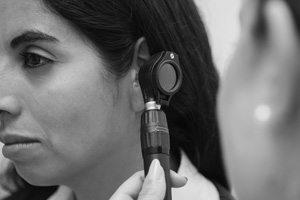View the complete list of conditions
Chronic Ear Infections
Chronic ear infections and other long-term middle ear problems can persist for months or years without improving or recur frequently. Chronic ear infection (chronic otitis media) can also cause holes in the eardrum that may not heal, hearing loss and growths in the middle ear.
The middle ear is a chamber that contains small bones involved in hearing, a membrane separating it from the outer ear called the eardrum, and a tube (Eustachian tube) leading to the nose and throat. When this tube becomes blocked by fluids from normal function, illness or allergies, fluid remains in the middle ear and may become infected or cause the eardrum to rupture from pressure. This condition usually causes pain and hearing loss and can lead to the infection spreading to nearby areas. Other, more severe complications, such as chronic mastoiditis (a bone infection behind the ear in the mastoid), can also develop if middle ear infections are left untreated.
Although middle ear infections are most common in children under two years old, they can occur in adults, too. Here are some risk factors for ear infections:
- Exposure to cigarette smoke and other airborne pollutants
- Allergies
- Cold or upper respiratory infection
- Immature immune system
- Small Eustachian tubes
- Large or infected adenoids
- Attendance at daycare or schools
- Cleft palate
- Bottle-feeding in infants
Chronic Ear Infection Symptoms
Patients can have chronic middle ear infections for years with no symptoms and mild hearing loss. When the middle ear is acutely infected, the pain may worsen. The symptoms associated with chronic middle ear infections are generally milder than those linked to acute ear infections. Symptoms can be present in either or both ears and can be steady in nature or intermittent. Some of the most notable symptoms of chronic ear infections in adults and children include the following:
- Hearing loss
- Mild fever or no fever
- Sensation of ear pressure
- Trouble sleeping
- Fluid draining from the ear
- Pain in one or both ears
- Loss of balance
- Loss of appetite
- Mild headache
Symptoms of a more serious middle ear condition requiring immediate medical attention include the following:
- Fever
- Severe headache
- Confusion
- Swelling or redness behind the ear
- Severe pain
- Dizziness
- Facial nerve weakness or paralysis
Infants and young children with infections often become fussy. Tugging or pulling on the ear may be another sign of infection. When an acute (sudden) ear infection is treated quickly, patients can often avoid having their acute infection develop into a chronic ear infection. Follow-up visits after treatment for an ear infection are essential to determine if the condition has cleared or requires further treatment.
Can Ear Infections Cause Hearing Loss?
Infections or eardrum perforations change the structure and function of the middle ear, and these conditions can cause temporary or permanent hearing loss. Dr. Cohen will check your ears for signs of hearing loss due to acute or chronic ear infections using instruments such as an otoscope, otomicroscope, audiogram or tuning fork. More severe infections and complications may require CT scans or MRIs to check for rare causes of hearing loss.
Chronic Ear Infection Treatment
You should see a doctor for ear problems that last more than a day or if you see drainage from the ear or other severe symptoms. Prompt treatment for acute and chronic ear infections can avoid complications. Your doctor will decide which treatment option is best based on age, duration of infection and other underlying conditions or complications. Chronic ear infection treatment can include the following:
- Antibiotics (oral or ear drops)
- Pain medication
- Steroids, decongestants or antihistamines
- Ear drainage tubes (tympanostomy)
- Ear drum repair
- Surgery to remove growths
- Autoinsufflation (a technique to adjust air pressure in the ear)
Please get in touch with our office for an appointment. Dr. Cohen can treat chronic ear infection symptoms and other ear issues. In addition, he will help you understand all your treatment options.
Conditions
Ears
Nose
- Ballon Sinusplasty Surgery
- Concha
- Deviated Septum Relief In NYC
- Deviated Septums
- Fixing a Deviated Septum
- Identifying A Deviated Septum
- How Do I Know if My Nose is Broken?
- Nasal Polyps
- Nasal Polyp Surgery
- Nasal Septums
- NYC Nasal Polyp Reduction
- Septoplasty And Turbinate Surgery
- Treating a Deviated Septum
- Treating Nasal Polyps
- Turbinate Reduction
Throat
- Dysphagia
- Leukoplakia Treatments
- Reflux Laryngitis
- Swallowing Disorders
- Treating Anosmia
- Vocal Disorders
Allergies & Asthma
- Dealing With Allergic Rhinitis
- Managing Allergies and Asthma
- How to Allergy-Proof Your Home from Indoor Allergens
Sinus
- Chronic Sinusitis Treatment
- Endoscopic Sinus Surgeries
- Sinus Headache Cure
- Sinus Infection Treatment
- Sinusitis Surgery
- Treating Sinus Infections
Sleep & Snoring
- Diagnosing Sleep Disorders
- Having Trouble Sleeping
- Home Sleep Studies
- Pillar Implants
- Pillar Treatment for Snoring
- Sleep Apnea Conditions
- Sleep Apnea Specialists
- Sleepless in NYC
- Sleep Study Diagnosis
- Can Snoring Cause Health Issues?
- Treating Sleep Apnea
- Treating Snoring
- What is a CPAP Device?





